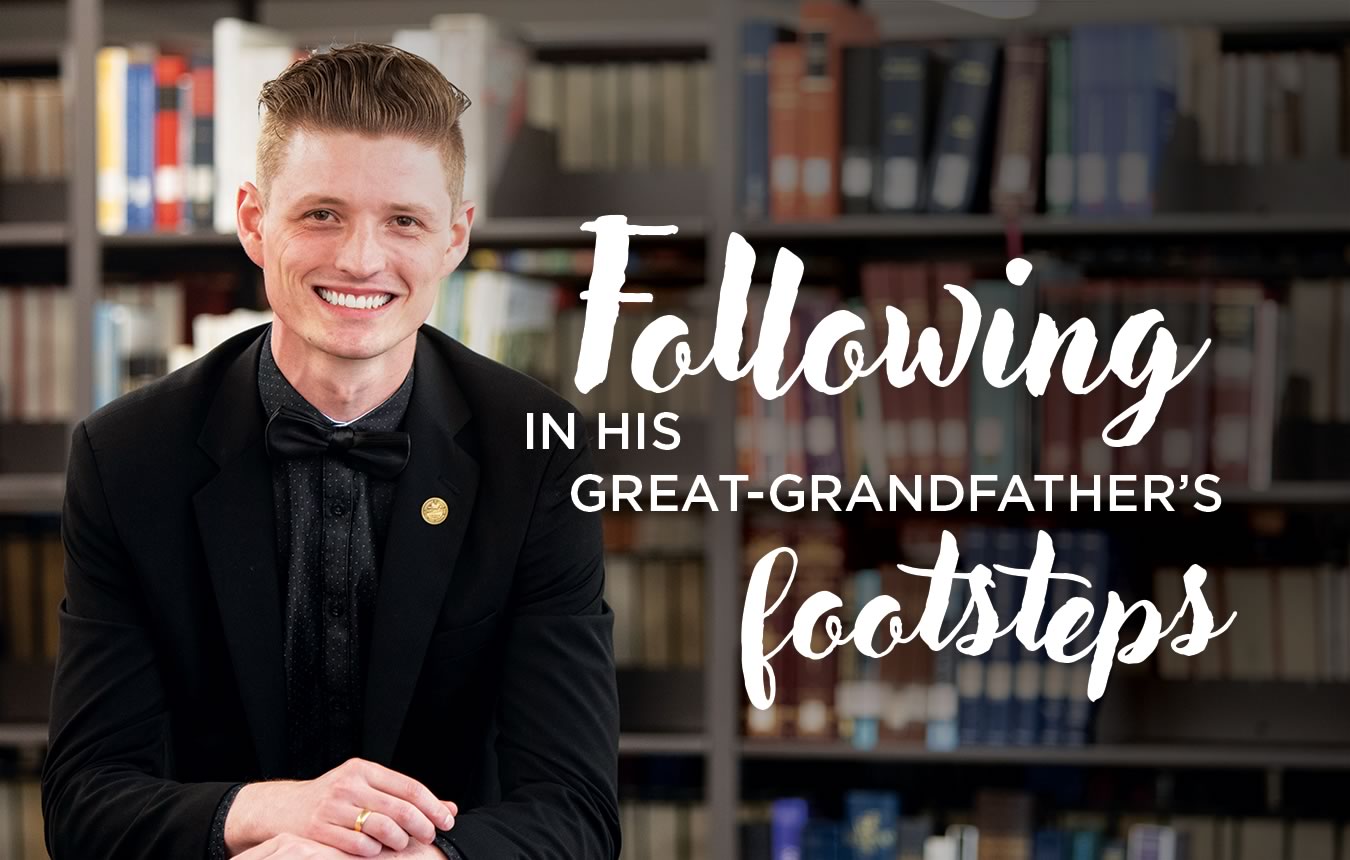
Concordia Seminary Newsroom
Following in his Great-grandfather’s Footsteps
Brazilian seminarian participates in yearlong exchange program

The year is 1914. Model T cars and horse-drawn buggies crowd the crossroads of South Jefferson Avenue and Winnebago Street near Concordia Seminary, St. Louis. A young man, William Adolph Herman Becker, prepares for a momentous occasion. He is about to graduate.
Fast-forward a century later. Becker’s great-grandson, Lucas, is attending Seminário Concórdia in São Leopoldo, Brazil, when he learns about the yearlong exchange program to attend Concordia Seminary thousands of miles away in the United States.
Lucas wondered: Should he seize an opportunity to study there like his father’s grandfather? He thought about him as he weighed the decision.
“After my great-grandfather’s vicarage, he was called as a missionary to the Brazilian state of Rio Grande do Sul — and he stayed there to serve,” Lucas says. “The Lutheran church in Brazil is the fruit of the mission from the United States. All of this made me want to apply for the exchange program.”
Lucas prepared himself. He studied for the exams that he would have to take to qualify for the International Seminary Exchange Program at Concordia Seminary that would begin in the fall of 2018. Through the program, students study at partnering seminaries across the globe.
“I deepened my knowledge of the right way to read the text of the Bible … and how to bring the Word into the lives of others.”
— Lucas Becker
Along the way he discovered some differences between the two cultures and seminaries, beginning with the length of the Master of Divinity (M.Div.) Program — the heart of The Lutheran Church—Missouri Synod’s (LCMS) preparation of forming pastors for its congregations and worldwide ministries.
“In São Leopoldo, students can go directly to seminary from high school, completing their Bachelor of Arts and M.Div. within six years. At Concordia Seminary, it’s four years [typically after a student has spent four years earning a bachelor’s],” Lucas explains.
“In Brazil, classes are about three to four hours long,” Lucas says. “Here, classes are about one and a half hours at the most, and reading takes place much more outside the class.”
But the main reason Lucas wanted to come to Concordia Seminary was for the theological education he could receive. He was thrilled when he was accepted into the Seminary’s exchange program. He recalls one of his favorite classes, Interpreting and Communicating the Word with Dr. Jeffrey Gibbs, professor of Exegetical Theology.
“It was about exegesis,” Lucas says. “I deepened my knowledge of the right way to read the text of the Bible, especially the biblical narratives, and how to bring the Word into the lives of others.
“I’ve also learned to not insert myself directly inside of biblical text, but to take what the text is saying in the context that it was given. For example, consider this verse from Joshua: ‘Have I not commanded you? Be strong and courageous. Do not be frightened, and do not be dismayed, for the Lord your God is with you wherever you go’ (Joshua 1:9 ESV). Many people will read that as a personal message. But it’s important to ask: For whom is God telling that? It’s for Joshua — and not primarily to me.”
Lucas is also grateful for the opportunity to refine his English. “English is a universal language and the best research is in English,” Lucas says. “Even in Brazil, we have to read books, commentaries and articles in English, so I’ve been thankful to practice it during the exchange program.”
 As he reflects on the art of communicating the Word, Lucas thinks back to his vicarage year in Brazil, where he served a parish with three congregations in Santa Maria de Jetibá, Espírito Santo. In this area of the country, two languages are spoken, Portuguese and Pomeranian.
As he reflects on the art of communicating the Word, Lucas thinks back to his vicarage year in Brazil, where he served a parish with three congregations in Santa Maria de Jetibá, Espírito Santo. In this area of the country, two languages are spoken, Portuguese and Pomeranian.
The Pomeranian language is a kind of German from the old country of Pomerania, which used to exist between Germany and Poland. German immigrants began settling in the southern Brazilian states around 1818, bringing the Pomeranian language and customs with them. Today, Pomeranian is not a written language. It’s mostly a spoken language.
“When I look back, I see how important the vicarage experience was in my life,” said Lucas. “Bringing the Word into the lives of others there meant learning from my own adviser about the lives, traditions and customs of the people — and to preach Law and Gospel to their own life context. This helped me prepare for the exchange program.”
In December, Lucas will finish the M.Div. in Brazil. “My church in Brazil is encouraging me to continue studying at Concordia Seminary. In the summer of next year, I’m coming back to start the Master of Arts Program, and would like to have the opportunity to pursue a Ph.D.,” Lucas says.
Whatever happens with his future theological studies, Lucas says he appreciates all he has learned at Concordia Seminary and looks forward to faithfully sharing the Word of God with a world that needs to hear it. “I come from a family of pastors,”
Lucas says. “My great-grandfather was a pastor, my grandfather is a pastor, my father is a pastor and now, I’m studying to become a pastor.”
Lucas’ family heritage is part of a much grander story, God’s story, serving Him wherever God sends him, whether in São Leopoldo, St. Louis or the ends of the earth.
Sarah Maney is a communications specialist at Concordia Seminary, St. Louis.